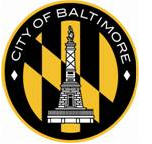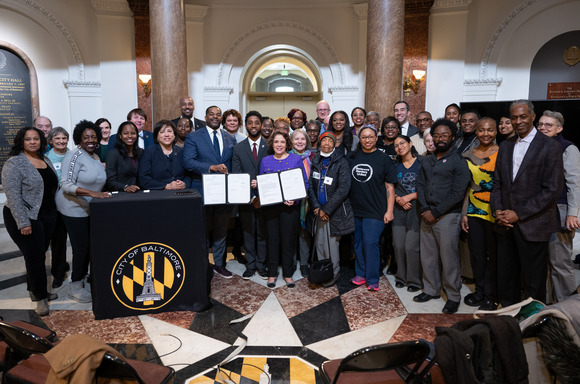Mayor Scott Signs Inclusionary Housing Bills Into Law
Monday Jan 22nd, 2024

FOR IMMEDIATE RELEASE

BALTIMORE, MD (Monday, January 22, 2024) — Today, Mayor Brandon M. Scott, alongside Council President Nick Mosby and Councilman Odette Ramos, and surrounded by dozens of housing advocates and community partners, signed two historic inclusionary housing bills into law. The two bills mark the first inclusionary housing legislation passed in Baltimore since the last bill passed in 2007, which expired in 2022.
“My entire time working on behalf of the City of Baltimore, it has been clear to me how critical the creation of inclusionary housing is for our residents,” said Mayor Brandon M. Scott. “As a city, we have a moral imperative to provide safe, affordable housing in all parts of our city. Access to housing is so often the difference between a family’s ability to have security and success or for them to face the most dire impacts that historic disinvestment can have on our communities. Bolstering our inclusionary housing system to aid in this effort is simply the right thing to do. I want to thank all of the advocates, including our partners who championed this on the Council for their dedication to this cause and tireless efforts to ensure Baltimore reinstated and improved our inclusionary housing policy.”
The inclusionary housing bills seek to build on the affordable housing work already being done across the City of Baltimore. In addition to inclusionary housing, the Department of Housing and Community Development (DHCD) reports that various developments and programs supported by the Scott Administration and DHCD have created over 2,000 units of affordable housing over the last 4 years.
“With a simple signature today, months of hard work from our Council and dedicated folks across the city culminates with a proud victory for hard-working Baltimoreans and a clear message that affordable housing for every citizen is the bare minimum,” said City Council President Nick Mosby. “The previous inclusionary housing legislation was a widespread failure and fell well short of even the most humble expectations. This historic bill corrects a decades-long failure, sets our city’s housing infrastructure on a path of progress for years to come, and gives a well-deserved seat at the table to the thousands of families in our city living paycheck to paycheck. They have more than earned the same luxuries and amenities, the peace of mind, the comfort that anyone else in this city may enjoy.”
“This inclusionary housing package is not only historic, it will also be effective,” said Councilwoman Odette Ramos (District 14). “For too long Baltimore claimed to have an inclusionary housing bill when in reality it had so many loopholes that only 34 units were produced over the last 15 years. With these two bills, we will truly have mixed income communities by creating affordable units where currently there are none. This is a significant step in eliminating the impact of our racist housing policies that were established in the very same chamber where we passed these bills. I want to thank Council President Mosby, Mayor Scott, the Administration, my colleagues, developers and all of the advocates for your tireless partnership to get an effective package that will produce inclusionary units. It was not easy, and it will work.”
Joining the Mayor and members of the City Council were dozens of representatives from housing advocacy groups, labor unions, and community partners across Baltimore and the entire state. Attendees included the Maryland NAACP, the Maryland AFL-CIO, 1199SEIU, BRIDGE Maryland Inc., Baltimore Renters United, Beyond the Boundaries, Community Development Network of Maryland, League of Women Voters Baltimore City, Maryland Center on Economic Policy, Maryland Inclusive Housing, Our Mother's Land, Public Justice Center, Southwest Partnership, Jobs Opportunity Task Force (JOTF), Homeless Persons Representation Project, Poppleton Community Association, and the Lawyers Committee on Civil Rights.
“Today, Baltimore City is making a historic step forward in its efforts to address exclusionary policies of the past with the passage of the Inclusionary Housing Law and the Inclusionary Housing Tax Credit Bills,” said Char McCready, a leader of Baltimore’s Inclusionary Housing Coalition and Maryland Inclusive Housing (MIH) Director of Housing. “This legislation ends a development policy that subsidizes segregation and separate-and-unequal development. Many members of the Inclusionary Housing Coalition have pushed for this outcome for over 17 years. I want to thank Mayor Scott, Council President Nick Mosby, Councilwoman Ramos, and all city leadership for their work to make this happen. We are looking forward to working with Mayor Scott, his administration, and community stakeholders to ensure the law is effective and produces affordable rental units citywide. This is a historic win for the people who live and work in Baltimore City.”
“The process to formulate the new Inclusionary Housing law included stakeholders from industry, advocates and government,” said Doug Schmidt, of Workshop Development, Inc. and the Baltimore Development Workgroup. “The final law was a well-considered compromise that balanced the goal of increasing housing options and the mechanics of Baltimore’s apartment market. I look forward to working with the Scott administration in its successful implementation.”
The Scott Administration has taken a series of steps to address housing issues throughout the last three years. In October 2023, Mayor Scott signed The Councilmember Mary Pat Clarke Tenant Opportunity to Purchase Act into law, which requires renters to have the first opportunity to purchase the home they live in if the landlord intends to sell it and protects against unreasonable price increases during the process. Mayor Scott also spearheaded an effort to effectively remove owner-occupied residences from the Tax Sale list, helping to aid long-time residents to stay in their homes.
Additionally, Mayor Scott announced a historic $3 billion plan to address the issue of vacant properties across Baltimore over the course of 15 years, alongside partners Greater Baltimore Committee (GBC) and BUILD. The plan, which includes a request for investment from the state, recently received a significant signal of support when the necessary amount of funding was included in Governor Wes Moore’s proposed state budget released last week.